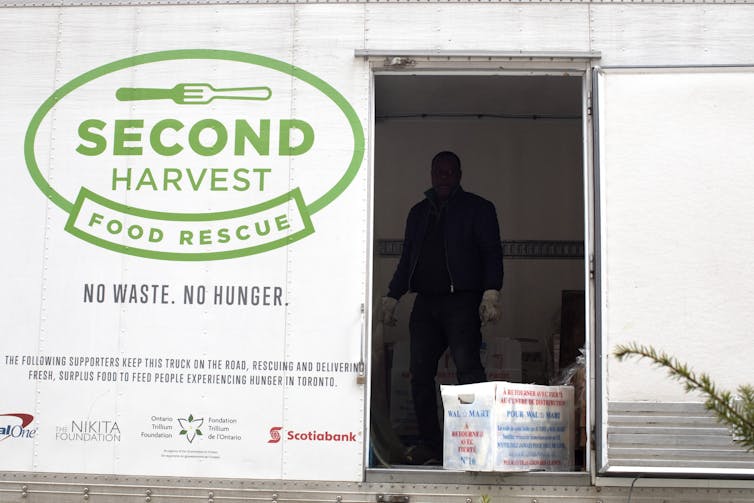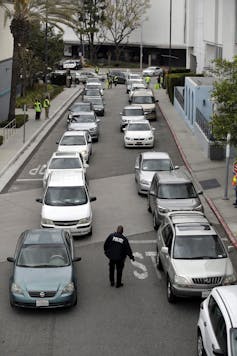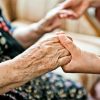
COVID-19 is revealing critical weaknesses in how we care for each other. While many Canadians are being thrown out of work and need emergency food assistance, food banks have had to shut down operations to deal with physical distancing requirements, reduce staffing as elderly volunteers stay home to self-isolate and ration food as donations decline.
The feel-good vibes of food drives might suggest that if we all just pitch in a little bit more, food banks could meet their goal of feeding all hungry Canadians. But decades of evidence convincingly shows food banks have never remedied the inadequate or insecure access to food faced by Canadians, whether in booming economic times or faltering ones.
There are thousands of food banks and affiliated agencies in Canada. Businesses and individuals donate millions of dollars, millions of pounds of non-perishable food and millions of hours of volunteers’ labour.
Yet rates of food insecurity in Canada are shockingly high and rising. The latest statistics from 2017-18 estimate that more than 4.4 million Canadians and one in six households with children worried about what to eat or reduced the quality or quantity of food they ate because of lack of money.
These numbers are higher than ever and we have no idea how much higher food insecurity rates will climb in the next few months as the impact of the coronavirus pandemic continues.
Lack quantity and variety
Even before COVID-19, only about a quarter of those who meet the objective criteria of food insecurity ever went to a food bank. Many neighbourhoods don’t have an accessible food bank or one with convenient hours. Food banks seldom have the quantity or variety of foods that people need for dietary and health needs or because of religious or personal reasons.

And even when food bank staff or volunteers are kind and caring, the experience of going to a food bank is inherently stigmatizing. This means many would rather go hungry than accept charity.
Food banks are simply unable to address the core reason that too many people don’t have enough food — poverty. Nearly all food bank clients report experiencing severe food insecurity, which means skipping meals, losing weight or potentially going for entire days without eating.
Given all we know about the insufficiency of food banks, it’s distressing to see governments promoting them as a means to address food insecurity.
Charity isn’t the solution

In late March, Premier François Legault told Québecers not to be ashamed to go to the food bank to get what they need. “It’s not your fault if you lost your job,” he said.
While this is true — no one should feel embarrassed for needing help — we should all be ashamed that government officials would point to food banks as the solution for deficiencies in government income supports.
The government of British Columbia then announced $3 million for the province’s struggling food banks “to help ensure that people continue to have access to the food they need.” And Prime Minister Justin Trudeau declared the federal government would invest $100 million for food banks and similar organizations so that “vulnerable Canadians can get the food they need, when they need it most.”
Let’s be clear: food banks have never been where Canadians can get the food they need.
For almost 40 years, governments of all political stripes have called on food banks to address food needs instead of developing meaningful policy solutions to reduce poverty. During the coronavirus crisis, politicians have thrown the frayed rope of charity instead of a strong lifeline to a robust social safety net.
People need sufficient income
Contrary to what our politicians are telling us, food banks have never — and cannot — adequately address food insecurity. Struggling Canadians need sufficient income to feed themselves now and in the post-pandemic future.
If we are “all in this together,” as politicians keep reminding us, perhaps new food bank users will join food bank veterans and other Canadians to demand that our governments provide a real safety net. This would include a basic income that would allow all of us to meet the material necessities of life.
The best sign of a successful national response to the food insecurity crisis is that food banks will finally close after 40 years — not because of lack of food or physical distancing rules, but lack of demand.
Elaine Power, Associate Professor in Health Studies, Queen’s University, Ontario; Jennifer Black, Associate Professor of Food, Nutrition and Health, University of British Columbia, and Jennifer Brady, Assistant Professor, Applied Human Nutrition, Mount Saint Vincent University
This article is republished from The Conversation under a Creative Commons license. Read the original article.
See also: Food banks fail to get food to majority of food-insecure families, study finds
With a special thanks to our generous donors who make publication of the Nova Scotia Advocate possible.
Subscribe to the Nova Scotia Advocate weekly digest and never miss an article again. It’s free!




I live in poverty on income assistance for reasons of disability. I don’t go to food banks. The main reason is I have no easy way to get back and forth to a food bank and can’t take more than a small amount of items back home with me. As a wheelchair user, I would have to book the Access-A-Bus, which means a long, exhausting ordeal as I have severe chronic fatigue and many other conditions that are aggravated by an outing. Although you ask to be somewhere at a specific time, they add on up to 90 minutes so you can have up to 30 minutes waiting at your home for the bus and you get to your destination up to an hour earlier than needed. Because you are now an hour early, you end up waiting up to two hours for the scheduled trip home. And where do you wait? Inside a building, outside in the rain and cold, or blistering summer heat? The bag hanging on the back of my wheelchair will only carry a small number of items that might last a few days so it’s not worth the hassle. Even if I was able to carry bags of food, we are not allowed to bring parcels on the bus. All we have must be secured to our wheelchair or body in a manner that does not prevent the wheelchair from being secured or pose a projectile hazard.
Most of the food offered is unsuitable for my dietary needs. Also, Feed Nova Scotia now requires first-time users to fill out a form detailing how much they make and how they budget it, etc. This would show that I receive amounts for special needs above the standard $850/mo and aside from wondering if they’d turn me away, it makes me uncomfortable getting free food when so many others on assistance get so much less than me. Even setting aside that last issue, the transportation is the biggest problem. Years ago, I asked Feed Nova Scotia if they would deliver to those in wheelchairs but they could not. Ironically, even if they now do that, it is of no use to me unless they bring the groceries into my apartment. In this pandemic era, delivery now means dropping items on the sidewalk in front of apartment buildings and not going into the building.
I’m not a medical professional but I’m well versed on obesity from personal experience. “…severe food insecurity, which means skipping meals, losing weight or potentially going for entire days without eating.” Actually, severe calorie restriction is more likely to cause weight gain, not weight loss, especially for those who already have metabolic, insulin, or glucose issues. In a nutshell, your body goes into starvation mode. Because you are eating a small amount, your brain perceives this as a threat of an impending total loss of food so your metabolism slows down and the small amount of calories you do consume are stored as fat in the abdomen. This is a throwback to our days as early hominids when it was feast or famine because we only ate if we killed an animal or found some edible vegetation. The reason why those who are starving during a famine in a third world country are emaciated, not obese, is because they are actually not eating at all for several days (until they are likely to die) and very suddenly in a short period of time. Whereas, those suffering food insecurity are still eating but very little, and sporadically, and have been doing this for months or even years. Also, the poor tend to eat more simple carbohydrates (white flour, white rice, sugar), which, even in low quantities can cause obesity as it interferes with the production of insulin. This is why diabetes and poverty go hand-in-hand. In addition, eating whole grains, fruits and veggies, and healthy fats (nuts, olive oil) helps stabilize insulin and blood sugar but the poor rarely eat those expensive foods. Furthermore, poverty causes extreme stress which can cause sleep deprivation or a disordered sleep schedule which is now know to cause obesity, diabetes, and heart disease.
It would cost the government less to give us a decent income so you gotta scratch your head as to why they prefer to spend more on diet related healthcare.